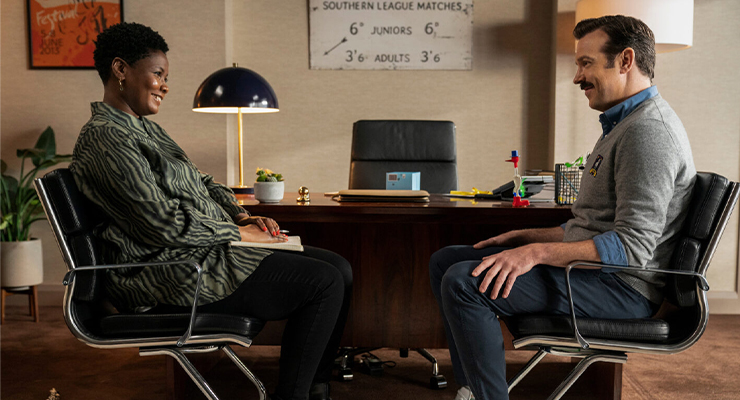
Put on your favorite football jersey and bake yourself some shortbread: tonight is the season finale of “Ted Lasso.” (And it might also be the last episode ever, but we’re too busy shouting WE’RE RICHMOND TILL WE DIE to listen to this pessimistic rumor.) Since the show aired in 2020 — providing a welcome, feel-good escape from pandemic life — we’ve come to feel part of the Richmond team’s “found family.” We aren’t ready to say goodbye just yet. As we prepare for tonight’s episode (and beg for a fourth season), let’s look back at the show’s surprising wisdom. Yes, “Ted Lasso” is full of life lessons — not just for footballers, but also for college students.
5. Step Out of Your Comfort Zone
In season one, Ted Lasso (Jason Sudeikis) travels across the Atlantic to coach the British football team AFC Richmond – even though he’s only ever coached American football, a very different sport. (In America, we would call British football soccer.) Hard-core Richmond fans are furious. Sports reporter Trent Crimm (James Lance) calls Ted “irresponsible.” But we know that Ted wasn’t irresponsible for taking this leap. He was brave.
“We can measure how brave you are by how vulnerable you’re willing to be,” says Brené Brown in her Netflix special, “The Call to Courage.” A research professor specializing in vulnerability, shame, and courage, Brown defines vulnerability as “uncertainty, risk, and emotional exposure.” If you’re being vulnerable, you’re willing to step outside your comfort zone even though you know that at some point, you’ll probably fail. And Ted has quite literally been set up for failure by his boss Rebecca Welton (Hannah Waddingham), who hired him to get back at her ex-husband, Richmond’s former owner. Like everyone else, she thinks this Kansas football coach is a joke.
The show could have easily been a football version of “The Office,” with Ted as a bumbling and arrogant coach in the vein of Michael Scott. Instead, Ted shows up with an open mind, a humble attitude, and an eagerness to learn. That’s what makes his journey a success.
Like Ted, you’ve embarked on an adventure filled with new experiences. You may have even chosen a college far from home. To make the most of your college years, channel your inner Ted and take chances:
- Join a club that interests you — especially if it’s outside your comfort zone.
- Ask questions in class. Follow Ted’s lead and acknowledge when you don’t understand something.
- Turn in your essay — even if you think it’s no good — instead of asking an AI bot to rewrite it for you.
- Put yourself out there and make friends (more on this later).

4. Build Relationships
“For me, success is not about the wins and losses. It’s about helping these young fellas be the best versions of themselves on and off the field,” Ted announces. He does this by building relationships — thinking of himself as a life coach first and a football coach second. Eventually, Ted admits that he does have to worry about winning some football games. (This practicality is hard for someone as whimsical as Ted, who enters most rooms with a rhyming salutation.) But he has the right idea: other people are more important than arbitrary measures of “success”.
You’ve got to be somewhat practical in college. If you tell your parents you failed the first semester because “success is not about the grades,” they won’t take it any better than Trent Crimm. But college really is about more than the score of your last exam. It’s a four year long opportunity to build relationships with peers, with faculty and — most importantly — with yourself. Yes, this does sound corny, but what did you expect? You’re reading an article on college life lessons from Ted Lasso. The guy says things like, “What do you say we do what the man says and make today our masterpiece.”
So how do you build relationships in college? You could follow Ted’s example and give out pink pastry boxes with homemade buttery shortbread cookies inside. But nobody has time for that in college. (Honestly, how does Ted even have time? Does the man sleep? Are his zany quips a sign of delirium?) Try this instead:
- Ask questions. Ask your classmate what their favorite book is (a classic Ted icebreaker), what they plan to major in, or how they are settling into freshman life. People love talking about themselves so much, they’ll choose it over money. Maybe this is why Ted becomes so surprisingly popular at Richmond: he shows genuine interest in other people.
- Support your classmates. When reformed bully Jamie Tart (Phil Dunster) returns to the team, he wants to show everyone he’s changed. “I had this dope idea last night during my eyebrow threading,” he tells Ted. “I’m going to buy the whole team PS5’s. They will [expletive] love me.” When Ted suggests that Jamie might be trying to buy affection, an undaunted Jamie replies, “Exactly. What better thing to spend money on than love?” But of course, bribing his teammates isn’t the answer. Instead, he wins them over by supporting a team member’s protest of their sponsor, Dubai Air.
- Be resilient. Friendships don’t always come easy, whether you’re on a football pitch or a college campus. It took time for Ted to win over every member of the Richmond team — even gruff Roy Kent (Brett Goldstein), who initially said that he didn’t expect his career to end being coached by “Ronald McDonald.” Invite a potential friend to hang out with you, then follow up two weeks later with a second invitation. If it doesn’t work out, reach out to someone else — and, like Ted, understand that most people aren’t rejecting you. He doesn’t take Roy’s insult personally, because he knows it has more to do with Roy’s fear of retirement than anything else.
3. Take Care of Yourself
In season one, Ted earns a reputation as an amateur psychologist who cares about the emotional well-being of his players, colleagues, and friends. But in season two, we realize that Ted lacks the ability to take care of his own emotional health. “He’s not emotionally available to everyone because he’s done the hard work of healing old wounds; he is emotionally available to everyone because he doesn’t believe his own needs are as important,” explains this Vox article. He has repressed his grief over his father’s death for so many years, it’s become his default setting. All his emotions — his sadness over the loss of his marriage, his anxiety as a football coach, his homesickness and guilt over leaving his son — have been shoved deep down. And he is terrified of exploring them.
In his first session with Dr. Sharon Fieldstone (Sarah Niles), the sports psychologist for AFC Richmond, Ted can’t decide where or how to sit. He poses — like “Don Draper, right?” — on the leather couch. Then he lies down, propping himself on his elbow “like a couple of kids on the top bunk” before settling into a classic therapy recline “like you see in New Yorker cartoons.” He folds his arms over his chest until he decides that it feels “a little too casket-y.” Finally, Dr. Sharon suggests he sit in the chair next to her and tells him not to worry, an acknowledgment of his own feelings that immediately terrifies him. He bolts out the door. It takes him two more tries to sit through a whole session. “Self-care can be scary,” Dr. Sharon says, but it’s the only thing that will set him free.
Even though, like Ted, you might feel nervous about trying therapy, it’s one of the best things you can do to support your mental, emotional, and social well-being. Here are some tips to get started:
- Most colleges and universities offer counseling to students. For example, USF provides free, confidential sessions for individual, group, and couples therapy.
- Look up mental health professionals in your area. If you’d like to go beyond the resources at your school, you can search for therapists through association websites such as the American Psychiatric Association, the American Psychological Association, and the Association for Behavioral and Cognitive Therapies. You can also log into your insurance website to search for therapists covered by your plan. Once you have a list of names, look up reviews on Vitals, Healthgrades, and ZocDoc.
- Ask questions. If you’re not sure what therapist to choose, see if you can have an initial phone consultation. Ask about their credentials, what treatments they use, and their area of specialty.
- Get to know your therapist. Just like Dr. Sharon, a good therapist will take time to put you at ease and talk about why you’re here and how they can help.
- Be honest and vulnerable. When your therapist asks how you’re feeling, you may be tempted to follow Ted’s lead and say you’re “swell as well as fine and dandy.” In fact, a lot of us tell white lies to our therapists, pretending the treatment is helping because we don’t want to “fail.” But as Dr. Sharon says, counselors are only interested in the truth. They can’t help us if we aren’t being honest.
- Don’t give up. It’s easy to give up on therapy if you’ve had a bad experience. That’s what happened to Ted with his Very Creepy Couples Counselor. But as Coach Beard (Brendan Hunt) reminds him, “all people are different people” — you can’t write off all therapists because of one. It might take time to find someone who’s the right fit for you, too, but that person is out there, ready to help you.

2. Believe in Yourself
This wouldn’t be a Ted Lasso article without a big, bold declaration to Believe. In fact, Ted would urge you to cut out dozens of yellow construction paper rectangles, write Believe on each of them, and stick them all over your dorm room. But what are you supposed to believe in? The show has offered many answers over the last three seasons. Believe in your teammates (or, in your case, perhaps your classmates). Believe in the innate goodness of other people. Believe in the indomitable spirit of AFC Richmond. Believe in belief! But most of all, believe in yourself. Ted says this from the very first episode. When asked if he believes in ghosts, he says, “I do. But more importantly, I believe they need to believe in themselves.”
Believing in yourself means “having confidence in your own abilities… [and] being able to trust yourself to do what you say you do and knowing that those efforts will result the desired outcomes,” according to the Berkeley Well-Being Institute. Here are a few ways you can boost your belief in yourself:
- Give yourself affirmations. You may feel like Coach Beard, who replies with a slightly sarcastic “cool” to Colin Hughes’ (Billy Harris) affirmation: “I am a strong and confident man.” But affirmations have been scientifically shown to reduce stress: “a small study of college students found that those who did value-affirming writing exercises ahead of a midterm exam had lower stress levels the day before the test,” explains this Washington Post article. The key is to create affirmations that work for you and feel honest, the article suggests. For example, if it was too hard for Colin to say that he is a strong and confident man, he could say, “I’m working on believing that I am a strong and confident man.” If talking directly about your attributes feels weird, you can also focus on one of your values: “I love protecting the environment.”
- Act in a way that aligns with your values. This will help you build trust in yourself. For example, Sam Obisanya (Toheeb Jimoh) cares about his home country. When he found out that the team’s sponsor was hurting Nigeria’s environment, he risked his career as a professional football player by retracting his endorsement.
- Practice self-compassion. You might think that believing in yourself looks like being the most confident person in the room. But that’s not quite true. Although self-confidence can be a good thing, it can also be easy to fake — not just to other people, but even to yourself, according to this New York Times article. Self-compassion, on the other hand, lets you see yourself for who you are — including your flaws and mistakes – and love yourself. “Self-compassion is treating yourself with the same kindness, care and concern you show a loved one,” says Dr. Kristin Neff, an associate professor of educational psychology quoted in the article. When you notice that you’re being too critical of yourself, change your inner voice to be more kind — how would you treat/talk to a loved one in your situation?
1. Reach Out
Let’s end with a classic Ted-ism: “Taking on a challenge is a lot like riding a horse, isn’t it? If you’re comfortable while you’re doing it, you’re probably doing it wrong.” College life won’t always be easy, but it’s worth giving your all. And whatever you’re going through right now, you don’t have to do it alone. That’s a big message in “Ted Lasso” — we do better when we have a team that has our back. As a college student, you have a literal team of staff whose only job is to help you. Take advantage of this resource by reaching out to your campus’s student activities center, counseling center, student support services, peer mentors, trusted faculty members and RAs.
To find out more about USF’s counseling and wellness services on our Health and Wellness page. And if you’re a current student who needs help, call the USF Counseling Center’s 24-hour emergency line at 813-974-2831.


